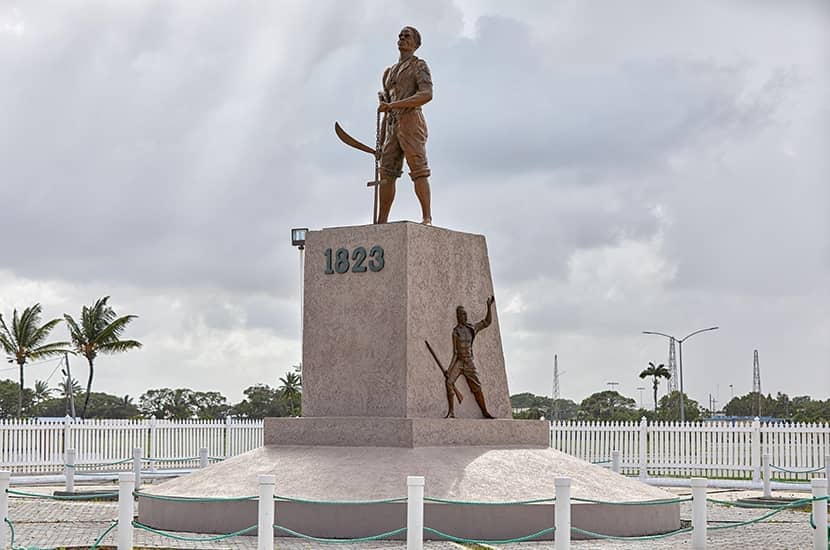The premise of White Debt is that the author’s ancestors ran a business selling a product grown by slaves. Therefore he wants to investigate Britain’s role in slavery — which is a rather odd framing, since his family’s tobacco firm wasn’t started until decades after slavery in British colonies was abolished.
But Thomas Harding apparently only recently learned that slavery happened in the British Empire. He goes as far as to ask: ‘How could I not have known this?’ Well, truly, I don’t know. I don’t recall the time when I wasn’t aware that slavery was the reason that people of African descent live in the Caribbean today. Some of their ancestors were enslaved in territories that belonged to Britain. Yet Harding’s revelation about this issue leads him to think that most of his readers are similarly ignorant, and it is his place to inform us.
For his main subject he has chosen a slave uprising in Demerara that took place in 1823. His narrative draws on contemporary accounts and court records, shaded with novelistic elements (what people thought and smelled and looked like), so that it reads as a continuous chronological narrative. The outcome for the Demerara fighters (Harding calls them ‘abolitionists’) was what happened when enslaved people tried to assert their rights by force elsewhere. The local authorities — in this case the militia and the courts — unleashed brutal reprisals.

But what’s strange is that in between every chapter about Demerara is a shorter chapter about Harding himself. He buttonholes friends in Britain, asking them how they feel about slavery. He visits Guyana and talks to scholars there. He contemplates reparations. He wants us to see how much he is acknowledging his white guilt. He has read Kendi and DiAngelo.
At one point he goes so far as to acknowledge that the incidents in Demerara had no direct connection to his family’s business. That firm sold tobacco, from Virginia and Cuba, many decades later. The argument that, nonetheless, it was all part of the same system of the subjugation of Africans in agricultural labour in the New World is of course true in the widest sense. Yet his claim that the location of his book’s theme ‘didn’t matter’ sits awkwardly. It feels as though he simply flipped through history’s grotesque rolodex of slavery and picked one incident to make himself the focus of.
A better book with a related approach is Alex Renton’s Blood Legacy. He is writing specifically about the plantations that belonged to his own family in Jamaica. His ancestors kept records, so he is able to draw on them for the realities — human and economic — of slavery in Jamaica, allowing him to paint a detailed picture of their world.
Our phones and computers contain cobalt, probably mined by child slaves in DRC
Scots trading families who sent sons to the Caribbean to buy land and people were a trend in the 18th century. Renton refers to it as a ‘gold rush’, one to which his family came somewhat late. He wants to understand how his ancestors felt about their role as slave owners — as traders of commodities produced by unfree labour.
He also acknowledges the difficulty of establishing what slavery was worth. It’s almost impossible to translate a sum from 250 years ago into modern currency with any accuracy, so to consider how much people ‘profited’ is murky. But we can see their relative wealth at the time, in the grand houses (in Britain and the Caribbean) and the prominent social position many planters enjoyed.
Renton continues his story after abolition, and after his family’s plantation story ends, to write a broader history of Jamaica and how much the legacy of slavery has shaped its course. Blood Legacy is a dense book, but Renton wants to put the slave trade in a broader context. As one of his interviewees notes at the start, she (a black woman) does not want any more ‘slavery porn’ — narratives of deaths on plantations or on slave ships. Renton steers clear of that kind of lurid story and states he is giving the profits from the book to charity.
Both authors are judging people in the past for participating, however indirectly, in the slave trade. As Renton notes: ‘It is hard to imagine any Briton, from the poorest to the richest of the 19th century, who did not in some way benefit from slavery.’ Anyone who wore cotton, smoked tobacco or put sugar in their tea was benefiting at some point from someone else’s forced labour. A defender might say they had no choice: there was no ‘fair trade’ cotton to be had. People who wanted clothing had to buy what was available.
True enough. But it’s also easier to judge at several generations’ remove, and to think of slavery as something bad that happened in the past and is now over. Yet all of us today benefit from unfree labour. Our phones and computers contain cobalt, probably mined by child slaves in the DRC. Isn’t that awful, we think. But we need computers for work. Are we really any better than those who smoked tobacco or bought molasses 200 years ago? Perhaps we focus on the slave-owners of the past so that we don’t have to think about our own complicity in exploitation today.






Comments